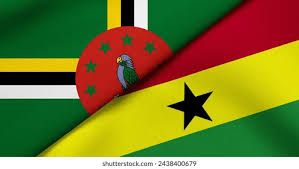By: Emmana Jeffers
Strengthening Diplomatic Ties: A Prelude to Trade Exploration
In January 2024, the Prime Minister of Dominica, Roosevelt Skerrit, went on a diplomatic mission to Ghana to explore areas of cooperation with that country’s Vice President, Dr. Mahamudu Bawumia. This visit builds upon existing relations between the two states, demonstrated by the signing of an agreement in 2021 to waive visa requirements. Discussions during the visit covered various areas of mutual benefit, including the strengthening of cultural, tourism, economic, and diplomatic ties. Such engagements highlight the commitment of both countries to fostering South-South relations through diplomacy and signify proactive strides towards realizing the potential of Caribbean-Africa relations. To foster more robust trade relations between the two countries, it is critical to identify key sectors with the potential for growth and expansion. One such area of focus, as mentioned in the communique of the Prime Minister’s visit, is Culture.
This SRC Trading Thoughts piece will briefly explore the possibilities of developing economic cooperation and cultural exchanges between Dominica and Ghana, with a specific focus on services within the cultural and creative industries.
Unveiling Trade Prospects through Cultural and Heritage Collaboration
Though often overlooked, the creative industry holds immense potential as a vehicle for economic exchange. UNCTAD Creative Economy Outlook for 2022 highlights that global exports of creative goods amounted to US$524 million in 2020, whilst exports of creative services reached a substantially higher US$1.1 trillion. Although direct data on the creative sector’s performance in Dominica is very limited, the Dominica Import and Export Authority (DEXIA) 2010-2014 strategic plan, highlights cultural services as a primary sector in trade. It identifies performing arts (live and recorded) and music as key concentrations, with heritage and cultural tourism as focus areas under tourism services. Carnival, cultural celebrations, and music festivals are major tourism products that encourage an increase in economic activity due to tourist arrivals and participation during the hosting of these activities. Thus, it is evident that the cultural and creative arts hold major potential economic value in driving trade and attracting foreign investment. As a Small Island Developing State, diversification in trade is critical to enhancing competitiveness as the country faces many limitations. Dominica is vulnerable to external shocks, natural disasters and its smallness in size, human capital, and economy poses many market constraints. Therefore, exploring the potential of the cultural sector, which holds great promise, and establishing connections with the African market through Ghana could be instrumental in nurturing the sector’s development and catalyze positive economic growth across various sectors of the Dominican economy.
Assessing Trade Trends and Opportunities
Dominica’s active efforts to enhance accessibility to the Island through the construction of an international airport highlight the necessity of establishing new connections to tap into emerging markets. Africa should not be overlooked as a potential market for trade and investment. Notably, the African Union considers the Caribbean as the possible 6th region of Africa and as a strategic partner in foreign relations. The International Trade Center report Expanding African-Caribbean Trade states that “Africa and the Caribbean have more than $1 billion in export potential across a range of goods and services sectors.” Creating historical and cultural connections is one of the acknowledged pressing factors in forging relations between the regions and remains central in every conversation concerning Africa and the Caribbean. Dominica and Ghana share cultural elements, with notable similarities found in the celebration of Carnival, food, and other cultural traditions. These similarities can be the basis for enhancing trade collaboration between the two nations.
Nurturing Cultural Exchange for Trade Development
Despite differences in size, population, and economies, both countries value and appreciate their cultural customs, which can be observed through the integration of their cultural traditions in their tourism products. Despite current challenges in accessibility, cultural trade remains viable through information technology communications (ITC), which can facilitate the exchange of music, film, and fashion across borders. Cultural Services is recognized as a sustainable economic industry for trade amongst developing countries. There are programs available like the recently relaunched Cultural and Creative Industries Innovation Fund from the Caribbean Development Bank that offers technical assistance and grant funding for the advancement of the sector. Dominica’s policymakers can leverage these opportunities by crafting a modern cultural policy that recognizes the sector’s economic benefits, fostering exchange with emerging markets like Ghana. Collaboration in festivals, such as Dominica’s Independence Season and the World Creole Music Festival, and Ghana’s Independence Day and Afro Future festival, offers valuable experiences. These can be captured through film, as demonstrated by Ghanaian YouTuber WODEMAYA who showcases how tourism, digital technology and social media all converge within cultural services.
Conclusion
Thus, it is conclusive that the creative and cultural industries hold immense potential as a sector for Dominica’s trade industry, which can be explored with Ghana. Ghana’s large population size and rich historical heritage provide ample opportunities for mutually beneficial collaboration and economic growth. By leveraging their shared cultural elements and historical connections, Dominica and Ghana can embark on a journey of trade and cultural exchange that fosters stronger diplomatic ties and paves the way for sustainable development in both nations. These shared experiences can strengthen social connections and build a sense of trust, making it easier for businesses and individuals from both countries to engage in trade, explore investment opportunities, and collaborate.


